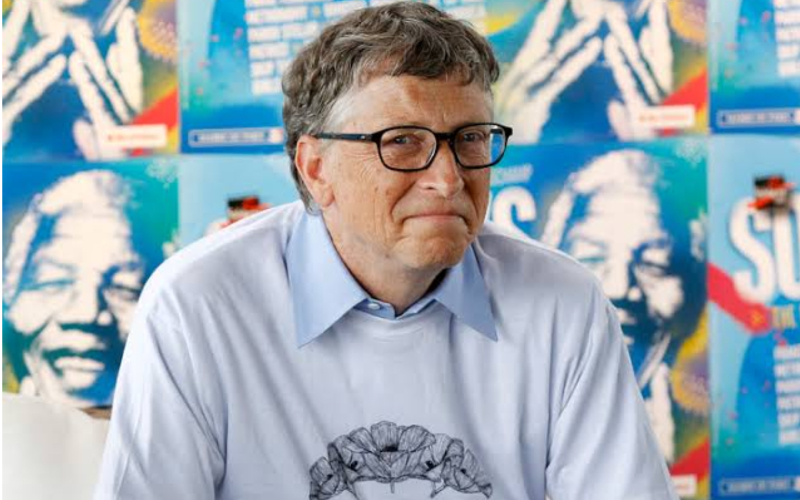Bill Gates, full name William Henry Gates III, is an American computer programmer and entrepreneur who cofounded Microsoft Corporation, the largest personal computer software firm in the world. He was born in Seattle, Washington, on October 28, 1955.
Along with his late childhood friend Paul Allen, he co-founded Microsoft. Gates served as chairman, CEO, president, and chief software architect during his tenure at Microsoft. He also served as the company’s largest individual shareholder until May 2014. He played a significant role in the microcomputer revolution of the 1970s and 1980s as an entrepreneur.
Bill Gates: Profile Summary
Full Name: William Henry Gates III
Popular Name: Bill Gates
Date of birth: October 28, 1995
Age: 67
Place of birth: Seattle, Washington, USA
Profession: Entrepreneur, Philanthropist
Education: Havard University (Dropped out)
Active Years: 1972- present
Spouse: Melinda French (m. 1994, div. 2021)
Children: 3
Parents: Bill Gates Sr. (Father), Mary Maxwell (Mother)
Net Worth: 105 billion USD
Bill Gates: Early Life
On October 28, 1955, Bill Gates was born in Seattle, Washington. He is the son of Mary Maxwell Gates (1929–1994) and William H. Gates Sr. (1925-2020).
He has English, German, and Irish/Scots-Irish ancestry. His mother was a member of the board of directors for the United Way of America and First Interstate BancSystem, and his father was a well-known attorney.
President of a national bank, J. W. Maxwell, was Gates’ maternal grandfather. Gates has two sisters: Libby, who is younger, and Kristi (Kristianne), who is older. Despite being the third William Gates in his family, he is referred to as Trey (or “Trey”) because his father had the “II” suffix.
Bill Gates: Career Highlight
At age 13, Gates created his first piece of software. He assisted in the formation of a group of programmers in high school who computerized the payroll system at their institution and went on to start Traf-O-Data, a business that marketed traffic-counting systems to local governments.
As a sophomore at Harvard University in 1975, Gates teamed up with his classmate Paul G. Allen from his hometown to create the first microcomputers’ software.
They started by converting the well-liked macro-based BASIC programming language for usage on small computers. After this endeavor was a success, Gates quit Harvard in his sophomore year and co-founded Microsoft with Allen.
When Microsoft licensed an operating system called MS-DOS to International Business Machines Corporation, the then-largest computer supplier and industry leader, for use on its first microcomputer, the IBM PC (personal computer), Gates’ influence over the developing microcomputer industry significantly grew.
Following the machine’s introduction in 1981, IBM soon established the technical benchmark for the PC sector, and MS-DOS similarly displaced other operating systems.
While Microsoft’s independence caused IBM and Microsoft to have contentious ties, Gates skillfully used the larger organization to make it permanently reliant on him for essential software.
Microsoft was also the go-to source for basic software for manufacturers of IBM-compatible PCs, or clones. He had established himself as the PC industry’s supreme kingmaker by the beginning of the 1990s.
Gates earned a massive paper fortune as the company’s largest individual shareholder, mostly thanks to Microsoft’s success. In 1986, he acquired the status of “paper billionaire,” and within ten years, he amassed a net worth in the tens of billions of dollars, making him, according to some estimates, the richest private individual in the world.
Gates initially favored to avoid the spotlight, addressing civic and philanthropic matters through one of his charities as he had few interests besides software and the potential of information technology.
However, Gates reluctantly became more well-known as Microsoft’s influence and reputation grew, particularly after it caught the attention of the antitrust division of the U.S. Justice Department.
Rivals painted him as driven, and intent to profit from almost every electronic transaction in the world (especially in rival Silicon Valley enterprises).
On the other side, his admirers praised his extraordinary business acumen, adaptability, and insatiable thirst for discovering fresh approaches to increasing the usefulness of computers and electronics through software.
Gates’ quick reaction to the sudden surge in public interest in the Internet exhibited all of these traits.
Beginning in 1995 and 1996, Gates fervently refocused Microsoft on the creation of consumer and business software solutions for the Internet, created the Windows CE operating system platform for networking noncomputer devices such as home televisions and personal digital assistants, established the Microsoft Network to compete with America Online and other Internet service providers, and, through Gates’s company Corbis, acquired the enormous Bettmann photo archives and other commercial photography assets.
Gates’ career at Microsoft was not the only thing that made him well-known. In 1994, he and his then-wife Melinda founded the William H. Gates Foundation (renamed the Bill & Melinda Gates Foundation in 1999) to support initiatives in the Pacific Northwest and programs for world health.
The pair also provided money for minority study fellowships through the Gates Millennium Scholars program and donated to North American libraries through the Gates Library Foundation (which was renamed the Gates Learning Foundation in 1999).
Warren Buffett made an ongoing gift to the foundation in June 2006, which would enable it to amass assets of about $60 billion over the following 20 years. The foundation continued to prioritize community and educational initiatives in the United States as well as worldwide health and development issues at the start of the twenty-first century.
In order to dedicate more time to the Bill & Melinda Gates Foundation, Gates gave up daily management of Microsoft in June 2008 after a brief transition period, but he remained chairman of the board.
He left his position as chairman in February 2014, however he remained a board member until 2020. He received the Presidential Medal of Freedom (2016) at this time.
In 2019, the doc series Inside Bill’s Brain: Decoding Bill Gates debuted. Gates and his wife filed for divorce two years later.
Bill Gates: Net Worth
Bill Gates net worth as of 2023 is estimated at 105 billion USD.











